2019年北师大版高中英语必修2 Unit5 Rhythm lesson 3 Experiment in Folk Grammar 课件(38张ppt)
文档属性
| 名称 | 2019年北师大版高中英语必修2 Unit5 Rhythm lesson 3 Experiment in Folk Grammar 课件(38张ppt) | 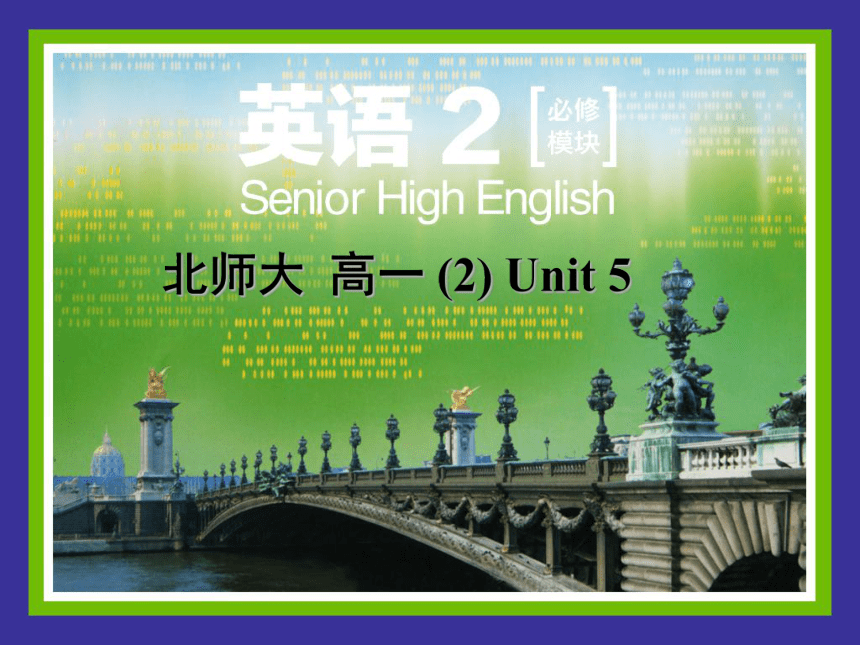 | |
| 格式 | zip | ||
| 文件大小 | 903.6KB | ||
| 资源类型 | 教案 | ||
| 版本资源 | 北师大版 | ||
| 科目 | 英语 | ||
| 更新时间 | 2019-04-26 09:42:32 | ||
图片预览


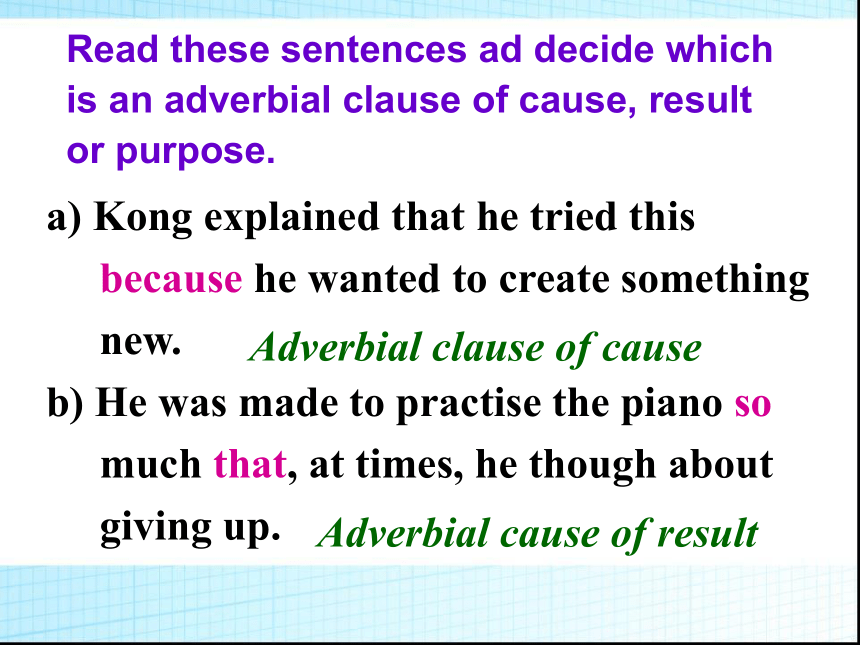


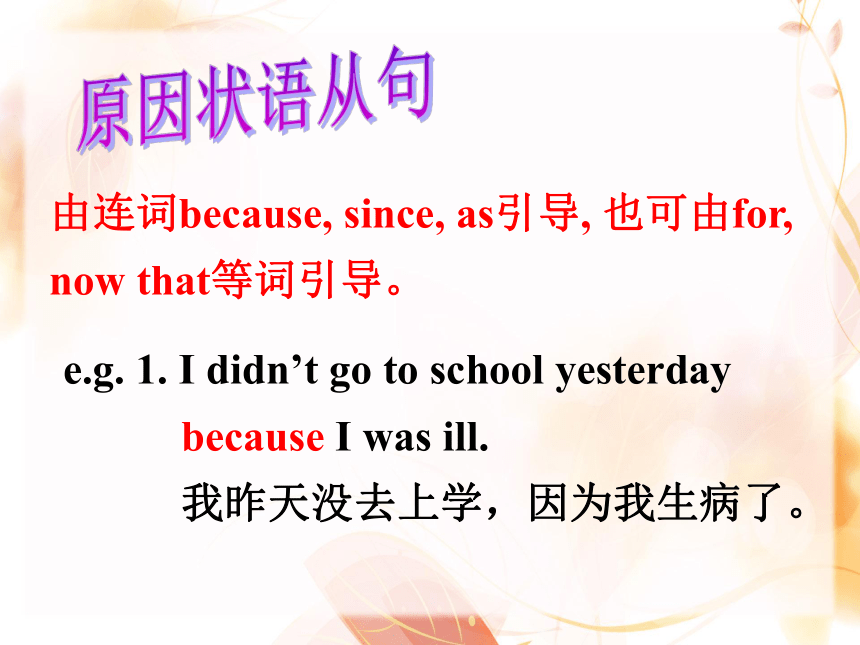
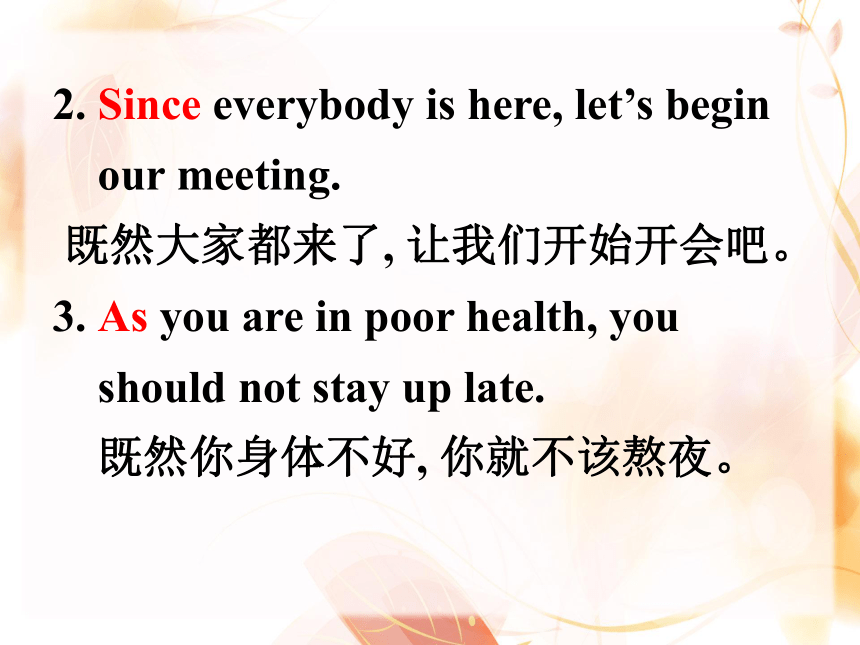

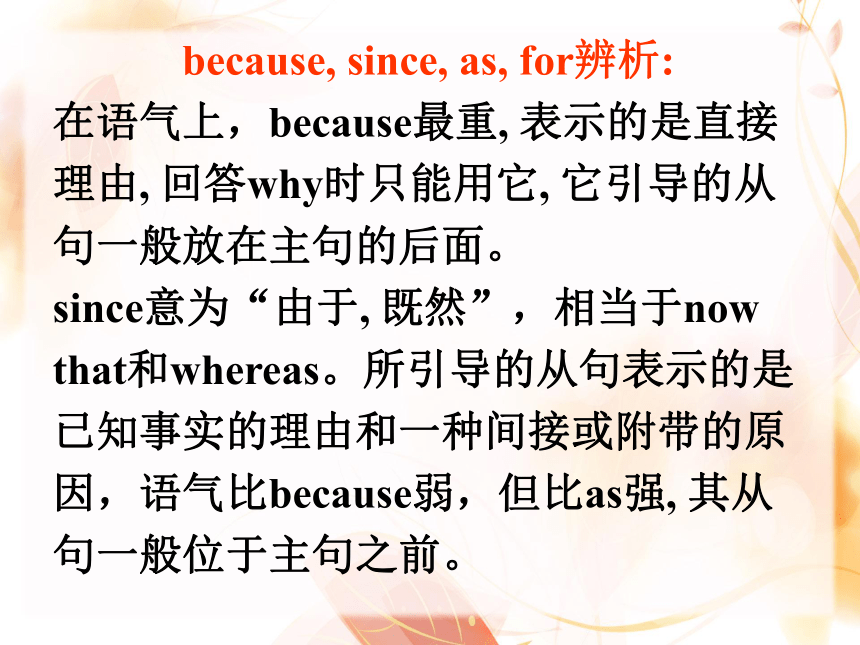
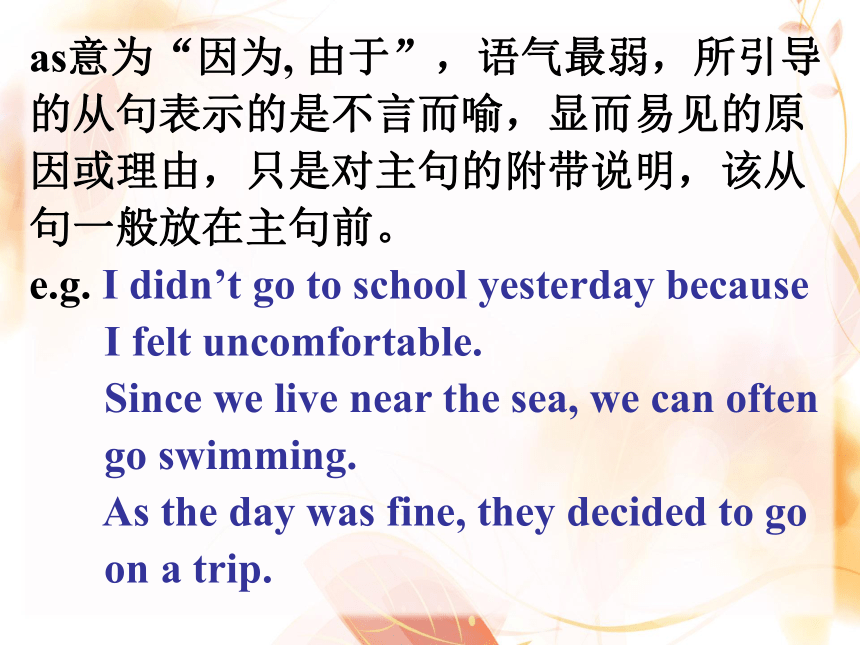

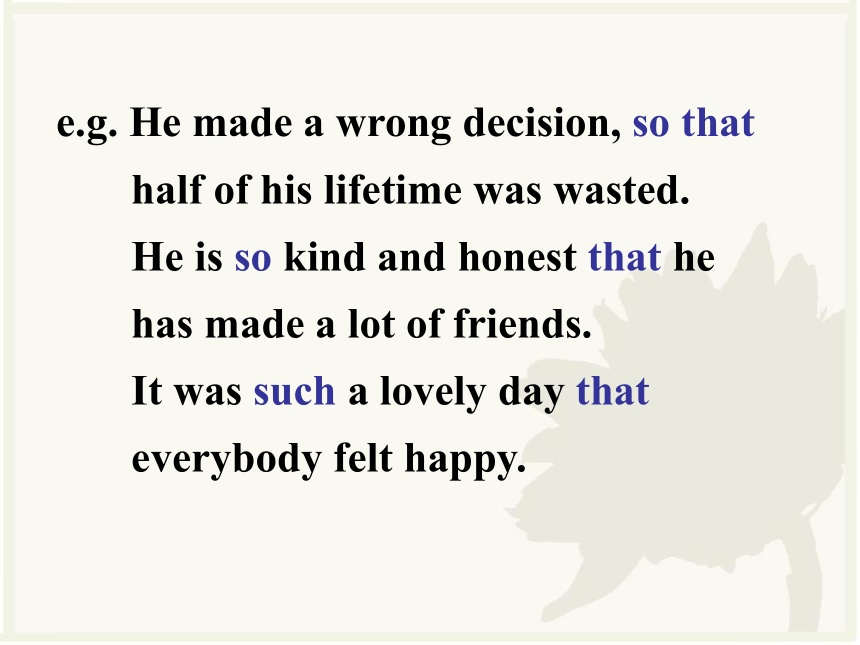
文档简介
课件38张PPT。北师大 高一 (2) Unit 5Adverbial Clauses (II):
Cause, Result and PurposeRead these sentences ad decide which is an adverbial clause of cause, result or purpose.a) Kong explained that he tried this
because he wanted to create something
new.
b) He was made to practise the piano so
much that, at times, he though about
giving up.Adverbial clause of causeAdverbial cause of resultc) The concert last week was such a success
that Kong’s Dream Tour Concert is
expected t run for the next two year.
d) As his mother was a great music lover,
he lived with music from birth.
e) Since his music style was new, he decided
his hairstyle had to be new too.Adverbial cause of resultAdverbial clause of causeAdverbial clause of causef) She had to draw piano keys on a
piece of paper so that he could learn
as early as possible.Adverbial clause of purpose由连词because, since, as引导, 也可由for, now that等词引导。e.g. 1. I didn’t go to school yesterday
because I was ill.
我昨天没去上学,因为我生病了。原因状语从句2. Since everybody is here, let’s begin
our meeting.
既然大家都来了, 让我们开始开会吧。
3. As you are in poor health, you
should not stay up late.
既然你身体不好, 你就不该熬夜。4. I asked her to stay to tea, for I had
something to tell her.
我请她留下来喝茶, 因为我有事要
告诉她。because, since, as, for辨析:
在语气上,because最重, 表示的是直接理由, 回答why时只能用它, 它引导的从句一般放在主句的后面。
since意为“由于, 既然”,相当于now that和whereas。所引导的从句表示的是已知事实的理由和一种间接或附带的原因,语气比because弱,但比as强, 其从句一般位于主句之前。as意为“因为, 由于”,语气最弱,所引导的从句表示的是不言而喻,显而易见的原因或理由,只是对主句的附带说明,该从句一般放在主句前。
e.g. I didn’t go to school yesterday because
I felt uncomfortable.
Since we live near the sea, we can often
go swimming.
As the day was fine, they decided to go
on a trip. 结果状语从句 结果状语从句是表示事态结果的从句, 通常主句是因, 从句是果。
结果状语从句由连词so that, so…that…, such…that…引导。e.g. He made a wrong decision, so that
half of his lifetime was wasted.
He is so kind and honest that he
has made a lot of friends.
It was such a lovely day that
everybody felt happy.such ... that ...和so ... that ...引导的结果状语从句用法区别:
so ... that ...和such ... that ...都可以引导结果状语从句,只是so为副词,一般修饰形容词或副词,而such为形容词,只能修饰名词。 常用句式结构如下:
(1) such + a / an+ (adj.) +单数可数名词+
that ...
= so +adj.+ a / an +单数可数名词+ that ...
(2) so +adj.+复数可数名词/ 不可数名词+
that ...
(3) so +adj. / adv.+ that ...
such + 复数可数名词/ 不可数名词+
that ... e.g. The box is so heavy that I can’t lift it
without your help.
Tom is so clever a boy that he can
answer all the questions correctly.
It was such a cold day that there was
nobody on the street.
These are such beautiful flowers that
we all like them. 提示:
1. 当名词被many / much, few / little修饰时用so而不用such。常用句式结构如下:e.g. There were so many people that we
could hardly move on.
There is so little ink in my pen that I
can’t go on writing.(1) so + many / few +复数可数名词+
that ...
(2) so + much / little +不可数名词+ that ...2. 当so / such部分置于句首时, 主句用
倒装语序。e.g. So excited was he that he could
hardly say a word.目的状语从句目的状语从句是用来补充说明主句中谓语动词发生的目的。目的状语从句可置于句首、句中或句末, 且从句中常有情态动词may, might, can, could, should等。引导目的状语从句的连接词有: so that, in order that, for fear that和in case等。 e.g. I shall write down your telephone
number so that I may not forget.
They worked harder than usual in
order that they could finish the work
ahead of time.
Put on more clothes for fear that you
should catch a cold.
Write the telephone number down in
case you forget.so that, such…that, in order that皆可引导目的状语从句和结果状语从句,
当他们引导目的状语从句时,从句的谓语里常常有can, could, may, might, will, would等词。 It’s such nice weather that all of us want to go to the park. (结果)
I’ll run slowly so that you can catch up with me. (目的)
I opened the window so that fresh air might come in. (目的)_________, __ and _____ can introduce a clause which explains the ______ of a certain action or situation.
_________ and _________________ can introduce a clause which describes the _______ of an action.Complete the ruleBecause assincecauseSo…thatsuch (a/an) …thatresult________ can introduce a clause which shows the ________ of a certain action or situation.So thatpurposeUnderline the adverbial clauses and mark them with R (for result), C (for cause) or P (for purpose).Example
He wants to play Chinese music so that the world can learn more about China. ( ) P Andrew is studying jazz because
he wants to be a jazz musician.
( )
2. Since Mary is busy, she can’t go
to the opera. ( )
3. As the weather is bad, the flight
will be cancelled. ( )CCC4. Harry is studying the erhu so that he can be an erhu musician. ( )
5. Suzi likes listening to pop music so much that she sometimes forgets to do her homework. ( )PR6. The dog buried his bone so that
the other dogs wouldn’t find it.
( )
7. He came to such a sudden stop
that we almost hit him. ( )PR高考链接( ) 1. His plan was such a good one ____
we all agreed to accept it. (2009年陕西)
A. so B. and C. that D. asC( ) 2. He had his camera ready
_______ he saw something that
would make a good picture. (2011山东)
A. even if???????? B. if only??? ????
C. in case???????? D. so thatC( ) 3. The police officers in our
city work hard ______ the
rest of us can live a safe life.
(2011上海)
A. in case B. as if C. in order that D. only ifCRead these sentences from the text. Work out the differences in pairs. Decide which: a) introduce a clause with a subject
and a verb?
b) introduce a noun or a noun
phrase? But because he persevered, he
soon became a great pianist.
2. Because of his talent, Kong
became famous worldwide.
3. Because of this, he decided to
look more closely at his own roots
and rediscovered the beauty in
Chinese folk music. a)b)b)4. ...he combined Chinese folk music
with the classical music because
he wanted to try something new. a)Complete these sentences with because or because of. He couldn’t see the view _________
the tree.
2. She was afraid ________ the dog
was frightening.
3. I can’t hear the music ________
he is talking.because of becausebecause4. He can’t walk very well __________
the accident.
5. The waves are huge __________ the
storm.
6. Jenny ate three bowls of noodles
________ she was hungry.becausebecause of because of Word building -ist 多指相信某种理论、制度或经常做某项
工作的人。如:botanist (植物学家),chemist(化学家),communist (共产党员),typist(打字员),violinist (小提琴家) …
-ian用于名词和形容词后, 表示“与…...有联系的人(物); 精通…...的人;…...地方的人(物)”。
如:mathematician (数学家)
-er加在动词后指人或机械;加在地名后面指
该地区的人。如:sampler (品尝家),
writer (作家), Londoner (伦敦人),New
Yorker (纽约人),…Use the suffixes below to fill the blank.-st, -ian The ______ (piano) who won the
competition was a very young
man.
2. I met a ________ (music) who
played many different instruments.pianistmusician3. Picasso is a famous _____
(art) who was born in Spain.
4. John knows the ________ (guitar)
in the band we watched last night.
5. The children watched as the
_______ (magic) pulled a rabbit
out of a hat!guitaristmagicianartist
Cause, Result and PurposeRead these sentences ad decide which is an adverbial clause of cause, result or purpose.a) Kong explained that he tried this
because he wanted to create something
new.
b) He was made to practise the piano so
much that, at times, he though about
giving up.Adverbial clause of causeAdverbial cause of resultc) The concert last week was such a success
that Kong’s Dream Tour Concert is
expected t run for the next two year.
d) As his mother was a great music lover,
he lived with music from birth.
e) Since his music style was new, he decided
his hairstyle had to be new too.Adverbial cause of resultAdverbial clause of causeAdverbial clause of causef) She had to draw piano keys on a
piece of paper so that he could learn
as early as possible.Adverbial clause of purpose由连词because, since, as引导, 也可由for, now that等词引导。e.g. 1. I didn’t go to school yesterday
because I was ill.
我昨天没去上学,因为我生病了。原因状语从句2. Since everybody is here, let’s begin
our meeting.
既然大家都来了, 让我们开始开会吧。
3. As you are in poor health, you
should not stay up late.
既然你身体不好, 你就不该熬夜。4. I asked her to stay to tea, for I had
something to tell her.
我请她留下来喝茶, 因为我有事要
告诉她。because, since, as, for辨析:
在语气上,because最重, 表示的是直接理由, 回答why时只能用它, 它引导的从句一般放在主句的后面。
since意为“由于, 既然”,相当于now that和whereas。所引导的从句表示的是已知事实的理由和一种间接或附带的原因,语气比because弱,但比as强, 其从句一般位于主句之前。as意为“因为, 由于”,语气最弱,所引导的从句表示的是不言而喻,显而易见的原因或理由,只是对主句的附带说明,该从句一般放在主句前。
e.g. I didn’t go to school yesterday because
I felt uncomfortable.
Since we live near the sea, we can often
go swimming.
As the day was fine, they decided to go
on a trip. 结果状语从句 结果状语从句是表示事态结果的从句, 通常主句是因, 从句是果。
结果状语从句由连词so that, so…that…, such…that…引导。e.g. He made a wrong decision, so that
half of his lifetime was wasted.
He is so kind and honest that he
has made a lot of friends.
It was such a lovely day that
everybody felt happy.such ... that ...和so ... that ...引导的结果状语从句用法区别:
so ... that ...和such ... that ...都可以引导结果状语从句,只是so为副词,一般修饰形容词或副词,而such为形容词,只能修饰名词。 常用句式结构如下:
(1) such + a / an+ (adj.) +单数可数名词+
that ...
= so +adj.+ a / an +单数可数名词+ that ...
(2) so +adj.+复数可数名词/ 不可数名词+
that ...
(3) so +adj. / adv.+ that ...
such + 复数可数名词/ 不可数名词+
that ... e.g. The box is so heavy that I can’t lift it
without your help.
Tom is so clever a boy that he can
answer all the questions correctly.
It was such a cold day that there was
nobody on the street.
These are such beautiful flowers that
we all like them. 提示:
1. 当名词被many / much, few / little修饰时用so而不用such。常用句式结构如下:e.g. There were so many people that we
could hardly move on.
There is so little ink in my pen that I
can’t go on writing.(1) so + many / few +复数可数名词+
that ...
(2) so + much / little +不可数名词+ that ...2. 当so / such部分置于句首时, 主句用
倒装语序。e.g. So excited was he that he could
hardly say a word.目的状语从句目的状语从句是用来补充说明主句中谓语动词发生的目的。目的状语从句可置于句首、句中或句末, 且从句中常有情态动词may, might, can, could, should等。引导目的状语从句的连接词有: so that, in order that, for fear that和in case等。 e.g. I shall write down your telephone
number so that I may not forget.
They worked harder than usual in
order that they could finish the work
ahead of time.
Put on more clothes for fear that you
should catch a cold.
Write the telephone number down in
case you forget.so that, such…that, in order that皆可引导目的状语从句和结果状语从句,
当他们引导目的状语从句时,从句的谓语里常常有can, could, may, might, will, would等词。 It’s such nice weather that all of us want to go to the park. (结果)
I’ll run slowly so that you can catch up with me. (目的)
I opened the window so that fresh air might come in. (目的)_________, __ and _____ can introduce a clause which explains the ______ of a certain action or situation.
_________ and _________________ can introduce a clause which describes the _______ of an action.Complete the ruleBecause assincecauseSo…thatsuch (a/an) …thatresult________ can introduce a clause which shows the ________ of a certain action or situation.So thatpurposeUnderline the adverbial clauses and mark them with R (for result), C (for cause) or P (for purpose).Example
He wants to play Chinese music so that the world can learn more about China. ( ) P Andrew is studying jazz because
he wants to be a jazz musician.
( )
2. Since Mary is busy, she can’t go
to the opera. ( )
3. As the weather is bad, the flight
will be cancelled. ( )CCC4. Harry is studying the erhu so that he can be an erhu musician. ( )
5. Suzi likes listening to pop music so much that she sometimes forgets to do her homework. ( )PR6. The dog buried his bone so that
the other dogs wouldn’t find it.
( )
7. He came to such a sudden stop
that we almost hit him. ( )PR高考链接( ) 1. His plan was such a good one ____
we all agreed to accept it. (2009年陕西)
A. so B. and C. that D. asC( ) 2. He had his camera ready
_______ he saw something that
would make a good picture. (2011山东)
A. even if???????? B. if only??? ????
C. in case???????? D. so thatC( ) 3. The police officers in our
city work hard ______ the
rest of us can live a safe life.
(2011上海)
A. in case B. as if C. in order that D. only ifCRead these sentences from the text. Work out the differences in pairs. Decide which: a) introduce a clause with a subject
and a verb?
b) introduce a noun or a noun
phrase? But because he persevered, he
soon became a great pianist.
2. Because of his talent, Kong
became famous worldwide.
3. Because of this, he decided to
look more closely at his own roots
and rediscovered the beauty in
Chinese folk music. a)b)b)4. ...he combined Chinese folk music
with the classical music because
he wanted to try something new. a)Complete these sentences with because or because of. He couldn’t see the view _________
the tree.
2. She was afraid ________ the dog
was frightening.
3. I can’t hear the music ________
he is talking.because of becausebecause4. He can’t walk very well __________
the accident.
5. The waves are huge __________ the
storm.
6. Jenny ate three bowls of noodles
________ she was hungry.becausebecause of because of Word building -ist 多指相信某种理论、制度或经常做某项
工作的人。如:botanist (植物学家),chemist(化学家),communist (共产党员),typist(打字员),violinist (小提琴家) …
-ian用于名词和形容词后, 表示“与…...有联系的人(物); 精通…...的人;…...地方的人(物)”。
如:mathematician (数学家)
-er加在动词后指人或机械;加在地名后面指
该地区的人。如:sampler (品尝家),
writer (作家), Londoner (伦敦人),New
Yorker (纽约人),…Use the suffixes below to fill the blank.-st, -ian The ______ (piano) who won the
competition was a very young
man.
2. I met a ________ (music) who
played many different instruments.pianistmusician3. Picasso is a famous _____
(art) who was born in Spain.
4. John knows the ________ (guitar)
in the band we watched last night.
5. The children watched as the
_______ (magic) pulled a rabbit
out of a hat!guitaristmagicianartist
